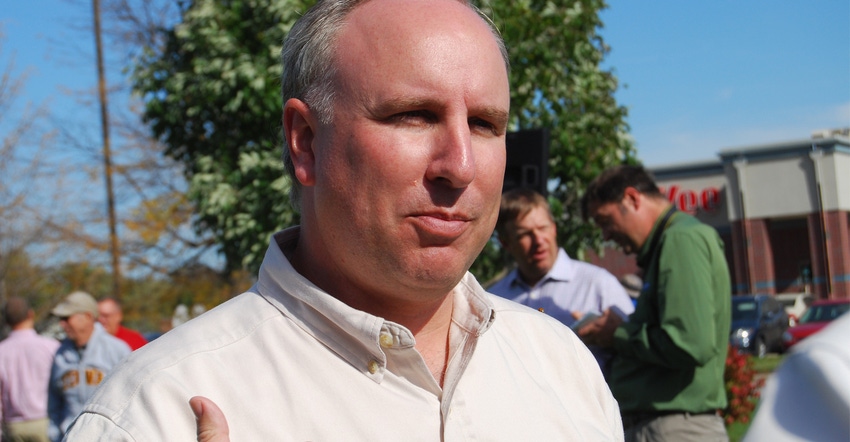February 26, 2018

A Pennsylvania oil refinery filed for bankruptcy last month, renewing the fight over the Renewable Fuels Standard, the 13-year-old federal law that requires the petroleum industry to blend a certain amount of ethanol and biodiesel in the nation’s motor fuel supply each year.
Pennsylvania Energy Solutions (PES) says one of the reasons it has requested bankruptcy and is struggling financially is because of the “exorbitant cost” of renewable fuel credits.
The renewable fuels industry, however, says this is an excuse to try to get rid of the RFS, which requires 19 billion gallons of renewable fuels to be blended into the nation’s gasoline supply. Refiners complain about the mandate, and the cost of Renewable Identification Numbers (RINs), which prove compliance with the law.
Cruz, Grassley lock horns
U.S. Sen. Ted Cruz of Texas led a rally at the bankrupt PES refinery on Feb. 21, casting himself as a champion of the workers and speaking against the federal ethanol mandate. Cruz wants to get rid of the RFS and has been locked in a battle with ethanol supporters for months. He’s gone so far as to put a hold on the nomination of Iowa Ag Secretary Bill Northey for a USDA post.
Iowa Sen. Chuck Grassley is critical of Cruz’s stance on ethanol, and says the PES bankruptcy is not based on the RFS, but rather management decisions the refinery has made.
“PES knows this is true which is why it initially banned Reuters from attending the anti-RFS rally after Reuters released an analysis exposing the embarrassing truth,” Grassley said in a media statement.
Monte Shaw, executive director of the Iowa Renewable Fuels Association (IRFA), says Cruz appearing at the PES rally was “a political move that has nothing to do with genuine concern for Philadelphia Energy Solutions employees and everything to do with enhancing Sen. Ted Cruz’s chances of re-election in Texas. Cruz hosted a town hall meeting at PES on Feb. 21 to discuss PES and his false claim that RIN prices caused PES to declare bankruptcy.”
IRFA’s questions for Cruz
Shaw says IRFA has compiled a list of 10 questions Cruz ought to answer about PES, RINs and the RFS.
1) No independent experts have disputed Harvard Professor James Stock’s conclusion that allowing E15 to be sold year-round would lower the cost of RINs. If the real problem is high RIN prices, why does Cruz oppose allowing the sale of E15 year-round?
2) Many experts, including the Kleinman Center for Energy Policy at the University of Pennsylvania, EPA, highly respected oil economist Philip Verleger, legal counsel for SIGMA and NACS, and many others have said RINs do not hurt refiners like PES because they recoup the costs when they sell their refined products. Why has not one independent expert stepped forward to say the PES-Carlyle Group-Cruz narrative on RIN prices is accurate?
3) Why did Cruz tell the president and Senate majority leader he had a “win-win” solution only to release a plan that would have severely hurt corn ethanol and eviscerated advanced biofuels? No sane person can say the Cruz plan was a win-win. Why does Cruz continue to mislead people?
4) Why is Cruz running interference for the politically connected Carlyle Group, which, according to Reuters, systematically sucked the equity out of PES leading to the current predicament?
5) Is Cruz’s defense of the Carlyle Group government bailout for PES and its questionable business decisions based on the thousands of dollars of donations Cruz has received from Carlyle Group principals?
6) Whether he supports the law or not, does Cruz approve of PES-Carlyle Group’s efforts to game the RFS system by selling its RINs prior to filing for bankruptcy?
7) Why did Cruz promise Iowans more market access for ethanol when campaigning in the Iowa Caucuses, but never introduced legislation to remove regulatory roadblocks and, in fact, even opposed the one effort to knock down unjustified roadblocks for ethanol blends (E15 RVP)?
8) Why does Cruz continue to hold the nomination of Bill Northey to a senior USDA post when he got the meeting with the president he originally sought? Every time his new demand was met, he simply changed the criteria for releasing his hold. Doesn’t this show that Cruz’s grandstanding is actually about his re-election in Texas?
9) Cruz once promised to “rescind the EPA’s blend wall, allowing ethanol to command a much larger share of the energy market.” If Cruz stands by that statement, what steps will he take to allow great market access for ethanol blends?
10) Does Cruz still believe there are unfair market restrictions on higher ethanol blends, or was that just a pandering talking point when he campaigned in Iowa? If he stands by his earlier statement, why has Cruz not introduced legislation or encouraged EPA to knock down the barriers to “full-market access” for ethanol blends?
IRFA represents Iowa’s liquid renewable fuels industry and works to foster its growth. Iowa is the nation’s leader in renewable fuel production with 43 ethanol refineries capable of producing nearly 4.4 billion gallons annually (including about 55 million gallons of annual cellulosic ethanol production capacity) and 12 biodiesel plants with capacity to produce 400 million gallons annually.
About the Author(s)
You May Also Like






